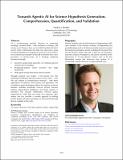Towards Agentic AI for Science Hypothesis Generation, Comprehension, Quantification, and Validation
Author(s)
Buehler, Markus
Download3701716.3718485.pdf (600.5Kb)
Publisher Policy
Publisher Policy
Article is made available in accordance with the publisher's policy and may be subject to US copyright law. Please refer to the publisher's site for terms of use.
Terms of use
Metadata
Show full item recordAbstract
AI is revolutionizing scientific discovery by connecting
seemingly unrelated fields – from mechanics to biology, and
science to art. However, how can we build AI models that don’t
merely retrieve information but make new discoveries, going
beyond interpolation to extrapolate to reason over never-beforeseen scenarios and concepts? In this talk we describe how a new
generation of physics-aware AI is breaking traditional
boundaries through:
• Innovative graph-based generative AI combining physics
and data-driven modeling
• Biologically-inspired neural structures that adapt
dynamically
• Multi-agent systems that mirror natural systems
Through practical case studies, I will present how this
technology transforms materials science across scales – from
silk and collagen to biomineralized materials – with direct
applications in medicine, food systems, and agriculture. The
versatility in agent development allows for expertise in diverse
domains, including knowledge retrieval, protein structure
analysis, physics-based simulations, and results analysis, is
presented. The dynamic collaboration between agents,
empowered by LLMs that can reason over sequences, data,
images, and text, provides a versatile approach to tackling
protein design and analysis problems, as demonstrated through
diverse examples in this study.
Description
WWW Companion '25, April 28-May 2, 2025, Sydney, NSW, Australia
Date issued
2025-05-23Department
Massachusetts Institute of Technology. Department of Civil and Environmental EngineeringPublisher
ACM|Companion Proceedings of the ACM Web Conference 2025
Citation
Markus J. Buehler. 2025. Towards Agentic AI for Science Hypothesis Generation, Comprehension, Quantification, and Validation. In Companion Proceedings of the ACM on Web Conference 2025 (WWW '25). Association for Computing Machinery, New York, NY, USA, 1643–1644.
Version: Final published version
ISBN
979-8-4007-1331-6